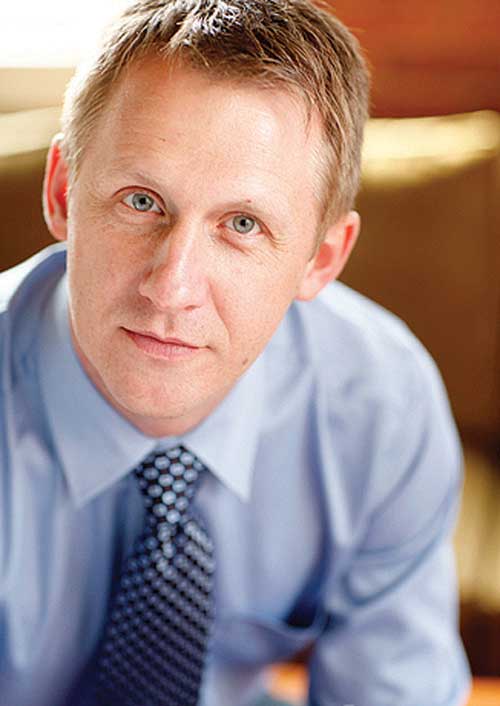When he enrolled in psychology at the University of Lethbridge, Dr. Mark Fenske (BSc '96, Distinction) had a goal – he wanted to help people.
The associate professor in the Department of Psychology at the University of Guelph, and co-author of the Canadian best-seller, The Winner's Brain: 8 Strategies Great Minds Use to Achieve Success, initially thought about becoming a counsellor. But after the opportunity to work as a research assistant for
Dr. Scott Allen opened up, Fenske found he was hooked on cognitive psychology.
"Lethbridge has some really good people. You get to know these people on a level that you probably wouldn't at a larger institution," says Fenske. "Working with Drs. Scott Allen, John Vokey and Don Read, who were the cognition faculty in the psychology department at the time, was a bit of an awakening for me. I was able to learn about memory, about how we interact with the world around us, what drives our behaviour, how we make decisions and how we pay attention.
"I learned there is so much more to psychology than the commonly-held view of people lying on a couch and talking about their problems."

Fenske made the most of his one-on-one opportunities with faculty.
"I was able to get a lot of face time with faculty and learn what life in a research lab is all about," he says. "It really cultivated a sense of excitement for research, and I was given a lot of responsibility. I learned a lot in terms of computer programming, setting up experiments, running subjects and how to analyze data. Those are skills and training that I otherwise might not have gotten until grad school."
By the time he graduated in 1996, Fenske knew that he wanted to pursue a career in academia.
"One of the driving forces for me has always been about how I can have a positive impact on others. A lot of the people who have had a major influence on my life have been teachers or instructors," he says. "If you are teaching three or four classes a year and each class has up to 100 students, you have the potential to have a positive influence on lots of people. And as an academic, when you are not preparing or giving lectures, you get to investigate important issues that you find interesting. It is a fantastic job."
Supported by NSERC scholarships, Fenske completed both a master's and PhD in psychology from the University of Waterloo by 2001. After a two-year post doc at the University of Wales in Bangor, Fenske moved to Boston, Mass. in 2003, where he began to integrate cognitive psychology with neuroscience, the study of the brain.
"In Boston I worked at the Martinos Center for Biomedical Imaging, where I had a dual appointment as a research fellow with Harvard Medical School and as an assistant in neuroscience at Massachusetts General Hospital (MGH). With rapid advances in neuroimaging technology, it became clear that we could learn a lot more by combining our study of human cognition with neuroscience," says Fenske. "Using MRI scanners, we were able to look at the structure of the brain and the areas of activation that related to different cognitive operations. What I now do is try to understand how it is that we do what we do. How do we pay attention to things, remember things and what elicits different emotional responses?"
Fenske spent four years at MGH and Harvard, the last two as faculty, before returning to Canada to work at the University of Guelph in 2007. In spite of the years of intense research and study, he has never lost sight of his original goal of helping people.
In recent years, he has worked on bringing the knowledge he has gained about cognitive-affective neuroscience to the general public. His work on The Winner's Brain with Dr. Jeff Brown serves as an example.
"The book is all about the neuroscience of success," says Fenske. "What we do with our brain – the different ways in which we stimulate, engage and care for it – can have a significant impact on the way it works, and even alter its physical landscape. We looked at what the latest brain science says about people that excel in key areas related to success, and the various strategies the rest of us can use to fine-tune our brains and become more successful."
GET THE FACTS
· The Winner's Brain was on Amazon Canada's bestseller list, ranking 20th in the All Books category and first in both the Psychology and Success classifications. U of L neuroscience instructor, Dr. Bryan Kolb, is featured in the book.
· Fenske writes a bi-weekly column, Better Brain, for the Globe and Mail newspaper.
· He is the recipient of grants in excess of $1 million and is currently working with the Gambling Research Exchange Ontario.
· Fenske has published more than 35 articles, abstracts and theses, and has presented at more than 40 conferences and seminars.
This story first appeared in the Legend. For a full look at the January issue of the Legend, follow this link.
